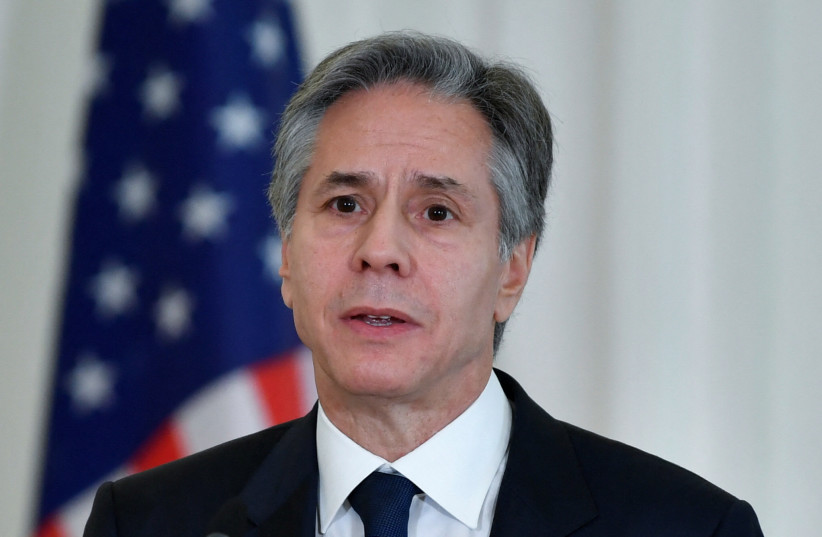Shayndi Raice, a Wall Street Journal reporter based in Israel, is hoping that Jews around the world dedicate a portion of their Passover seder this week to one of her colleagues, currently detained in a Russian prison.
“This Passover, please consider setting a place at your Seder table for @evangershkovich,” Raice tweeted on Sunday. “As you celebrate freedom, join us in demanding freedom for Evan.”
The call — echoing a tactic used in the 20th-century campaign for the freedom of Soviet Jews — grew louder on Monday as it was shared by prominent personalities from tech journalist Kara Swisher to the former chief rabbi of Moscow to Rabbi Angela Buchdahl of New York City’s Central Synagogue, who said she would be leaving an empty chair at her own seder in honor of Gershkovich, a Moscow correspondent for the Wall Street Journal.
Gershkovich, 31, has been charged with espionage, in a move that human rights organizations are decrying and the Biden administration is fighting. He was arrested Wednesday while he was dining at a restaurant in the city of Yekaterinburg, about 800 miles east of Moscow in the Ural Mountains.

The Wall Street Journal has denied the allegations against Gershkovich, who pleaded not guilty during a court appearance last week, according to Russian state and international media. He reportedly has not been able to speak to an attorney representing him while he is held in the notorious Lefortovo Prison, whose past inmates include the famous Soviet Jewish dissident Natan Sharansky.
Gershkovich is the first American journalist since the Cold War to face spying charges in Russia, which carry a sentence of up to 20 years in prison. People charged with espionage are almost always convicted in Russia, according to the New York Times.
“Let him go,” President Joe Biden said Friday about his message to Russian authorities in Gershkovich’s case, using a phrase that itself is redolent of the Passover story and the Soviet Jewry movement.
The arrest has propelled Gershkovich to the front lines of deepening tensions between the United States and Russia. It has also drawn attention to Gershkovich’s background as the child of Jews who fled the Soviet Union — and renewed questions about whether people like him can be safe in Russia today.
“He cares a lot about his identity as a Jew, and especially his identity as the son of Soviet Jewish immigrants,” his college roommate Jeremy Berke told the Jewish Telegraphic Agency. “I think that was a large part of why he wanted to go back to Russia.”
Gershkovich born to Jewish immigrants from former Soviet Union
Gershkovich was born in New York City to Jewish immigrants from the former Soviet Union who left in the late 1970s, when the Communist state briefly opened the gates to emigration for some of its Jewish citizens.
His father is from Odessa — today in Ukraine — and his mother is from St. Petersburg, Time Magazine reported. According to an account published by the Wall Street Journal, the only outlet to which his family has spoken, his mother fled Russia using Israeli documents with her mother, a Ukrainian Holocaust survivor, after hearing rumors that Jews were going to be deported to Siberia.
Gershkovich grew up speaking Russian at home in New Jersey, where he graduated from Princeton High School before heading to Bowdoin College in Maine. After college, he got a job first at the New York Times before moving to Moscow in 2017 to report for the Moscow Times, an English-language news organization that has been a launching pad for multiple high-profile Russia reporters. His reporting there included coverage of Hanukkah celebrations in Moscow. He was hired by the Wall Street Journal in 2021.

His mother told the Journal that Gershkovich had become more interested in his Jewish identity while in Russia, taking her to a synagogue that she had been warned as a child never to enter. “That’s when Evan started to understand us better,” she said.
“Part of his mission was to not only explain Russia to a Western audience, but to really kind of pierce the bubble and tell the stories of Russians themselves, which was something he was able to do, because he’s fluent in Russian,” Berke told JTA.
He said his friend sought to tell “stories that weren’t necessarily just the purely kind of economic stories that you saw coming out of the country, but that were really about what the people were doing — you know, people in synagogues, people in nightclubs, like all aspects of Russian society.”
Like many foreign journalists, Gershkovich left Russia in February 2022, after Russia invaded neighboring Ukraine and turned overnight into a pariah state that intensified its crackdowns on dissenters. But he returned later in the year on the longstanding assumption that foreigners would be insulated from the harsh treatment that Russian journalists can face.
“By detaining the American journalist Evan Gershkovich, Russia has crossed the Rubicon and sent a clear message to foreign correspondents that they will not be spared from the ongoing purge of the independent media in the country.” said the Committee to Protect Journalists. “Authorities must immediately and unconditionally release Gershkovich, drop all charges against him, and let the media work freely and without fear of reprisal.”
Gershkovich had most recently reported on Russia’s declining economic position and was reportedly in Yekaterinburg reporting on the Wagner Group, a Russian mercenary force, and Nizhny Tagil, a factory town where Russian tanks are made.
Wagner’s owner, Yevgeny Prigozhin, joked about Gershkovich and other journalists being found in a mass grave or a torture chamber when reached by the Daily Beast last week. Prigozhin said he had not known about Gershkovich’s arrest at that time.
Julia Ioffe, a fellow Russian-American Jew and journalist, said after Gershkovich’s arrest that the Kremlin takes criticism from people of their background differently than from other journalists.
“Although he was born in the US, his parents were immigrants from the Soviet Union, Jewish immigrants,” Ioffe told CNN. “There is a sense in Moscow, especially in the foreign ministry and in the Kremlin, that people of this background — my background — they are particularly sensitive to … our criticism. They feel that it is a different kind of betrayal.”
The former chief rabbi of Moscow who fled Russia shortly after the invasion of Ukraine last year suggested that Russia had targeted Gershkovich because of his identity.
“He just happened to be Jewish, right?” Rabbi Pinchas Goldschmidt sarcastically tweeted last week.
Goldschmidt has emerged as a prominent critic of the Russian government after leaving the country last year, saying that as a prominent rabbi he faced pressure to support Putin’s war.
“When we look back over Russian history, whenever the political system was in danger you saw the government trying to redirect the anger and discontent of the masses towards the Jewish community,” he told the Guardian in an interview late last year.
Gershkovich is not the first American to be arrested in Russia amid rising tensions between the countries. Last year, the basketball star Britney Griner was sentenced to nine years in a Russian prison on drug charges, then traded to the United States in exchange for the release of Victor Bout, a Russian convicted of dealing arms.
In a social media post this weekend, Griner called on the United States to “continue to use every tool possible to bring Evan and all wrongfully detained Americans home.”
The Wall Street Journal has made Gershkovich’s reporting free and produced a video highlighting his importance as a journalist. Meanwhile, Gershkovich’s Jewish supporters are putting their own spin on the campaigns to raise awareness of Gershkovich’s plight and lobby for his release.
“Dear friends, if you are in shul this weekend, please say an extra tefillah for the release of @evangershkovich, a @WSJ reporter and son of Soviet Jewish immigrants, who was detained this week by the Russian government,” tweeted Chavie Lieber, a Wall Street Journal reporter, last week. (Lieber was a JTA reporter in 2012 and 2013.)
On Monday, Raice’s call for a place at Passover seders for Gershkovich was being shared widely.
“A worthy endeavour. However, Evan is not the only political prisoner in Russia and Byelorussia. Thousands of people are being held in prisons in Russia and Byelorussia, among them Alexei Navalny, Vladimir Kara Murza, Ilya Yashin and others, many, who are of Jewish descent,” Goldschmidt, the former Moscow chief rabbi, tweeted. “We should remember all of them, when we celebrate freedom at the Seder table Wednesday evening!”
